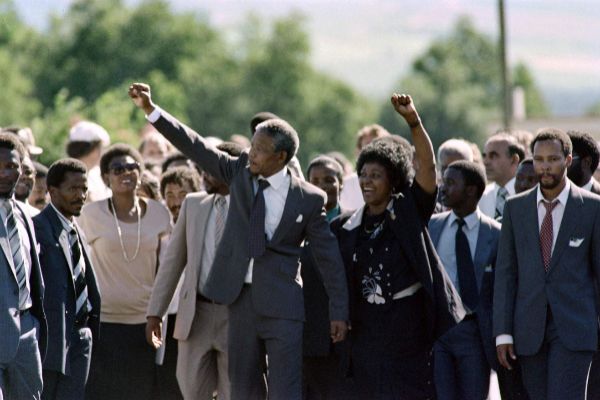- Profile: Robert Mugabe, the tyrant who could have been Mandela
- The correspondent's look: Gold slaves for the ghost mines of South Africa
Unlike Martin Luther King or Gandhi, Mandela was the only one of the three great pacifist figures of the twentieth century who was not killed (although he was about to be). He was able to work until the end and take his legacy far beyond his time and space. Today 30 years ago he left prison in South Africa after 27 years of imprisonment sentenced to life imprisonment to become the most admired politician in the world and his work is still alive in many aspects. In that long sentence the Government thought that Mandela would be defeated and silenced for life. They were wrong. An even more convinced and strengthened Mandela which Count of Montecristo emerged from his prison and became, with the number 466/64, the most famous prisoner in history .
Recall the image of Nelson Mandela, in a dark suit, raising his fist with his wife Winnie on February 11, 1990. With his humility, his charisma and an intelligence of a great chess master capable of winning several games at once, he convinced to his jailers, the Afrikaner supremacists of Frederik Willem de Klerk, that for themselves it was better to overcome the racist apartheid system , liberate and command together a democratic change in South Africa. De Klerk, seduced by Madiba , loosened the bond and freed the leader of the African National Congress. Both received the Nobel Peace Prize. With the collapse of the USSR, Mandela ceased to be a "communist threat , " as part of the West saw it, which favored his release.
But when it seemed that racial tensions were going to relax, they erupted in a crisis that almost led to a balkanization of the country , with ethnic groups fighting among themselves in the poor ghettos of the main cities. Mandela won the 1994 elections with the streets on fire and made his first draft decisions: dialogue between races and ethnicities Zulu, Xhossa, Afrikaner ... represented in the new government (including whites), and all equalized in rights in the Constitution, which included as official the 11 languages spoken in the country. In addition, he tried not to withdraw any privilege to the elite who had ruled the country, but tried to convince them that it is best to voluntarily renounce them. Unlike other black leaders, Mandela boosted the involvement of South Africa in the fight against HIV with the purchase of antiretrovirals, poorly seen by the community at that time. He was both a Machiavelli and a stubborn saint , promoter of justice, but also of reconciliation.
Mandela, with the country already pacified and reformed and on his way to a second term insured in 1999, did something unprecedented: to retire . Aware of the corrupting capacity of power, he limited his action to five years, enough for the shock wave of his policy to begin to be noticed soon in the countries of the region. From that moment he left his successor Thabo Mbeki in Pretoria and began to jump borders to export his model of mixed parliaments , with all ethnicities represented, strong constitutions and limitation of mandates.
He had a leading role in resolving entrenched conflicts such as Burundi or Congo, the scene of his first trip, when Mobutu and Kabila fought to the death. He approached Africanist leaders such as Gaddafi, who ended up forcing the perpetrators of the Lockerbie attack. He cried out against foreign and post-colonial interventionism in the continent and denounced the massive sale of weapons in African countries. Today many constitutions of the continent owe Mandela that effort. He wandered through Africa with his brightly colored shirts and in each country left part of his legend in phrases, attitudes or commitments. His personal legacy has allowed governments that have succeeded him and South African institutions to play an important role in Africa, and in the rest of the world, in favor of conflict prevention and negotiation and national reconciliation.
Their struggle for freedom and against racial segregation were much more successful than the effort to end economic differences in their country. Today, although the situation has improved, there is still a chasm between those same ruling elites and the population that lives in those ghettos. In fact, today we talk about the survival of an economic apartheid because the majority of South Africans are still condemned by extreme poverty. 1% of society owns 70% of wealth according to World Bank data.
According to the criteria of The Trust Project
Know more- Africa
- Nelson Mandela
- Burundi
PoliticsVistalegre III: Pablo Iglesias shields in March his leadership in Podemos taking advantage of his entry into the Government
Interview Antonio Garamendi, president of CEOE: "If the company is complicated by a labor standard, the same does not hire anyone. That is so"
Policy Year I of the PP-Cs government: Twelve months of transition towards "change"

